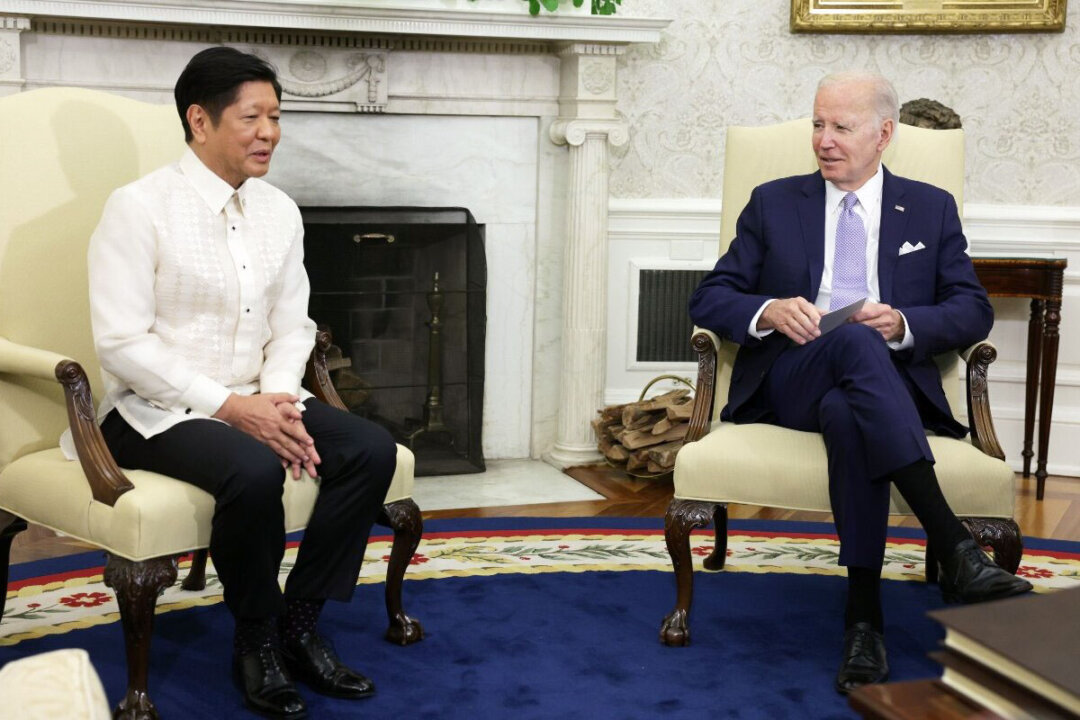The Philippines has criticized the Chinese regime for ‘escalatory actions’ in the new year.
Leaders of the United States, Japan, and the Philippines met virtually on Jan. 12, calling to further strengthen their cooperation under a trilateral framework created amid the Chinese communist regime’s increasingly aggressive posturing in the Indo–Pacific.
Outgoing U.S. President Joe Biden, Japanese Prime Minister Shigeru Ishiba, and Philippine President Ferdinand Marcos Jr. discussed trilateral maritime security and economic cooperation, as well as China’s “dangerous and unlawful behavior in the South China Sea,” according to a White House readout.
“The three Leaders agreed on the importance of continued coordination to advance a free and open Indo–Pacific.”
Biden, Marco, and then-Japanese Prime Minister Fumio Kishida held a first-of-its-kind summit in Washington in April 2024 to strengthen defense ties between the three nations. At the summit, the trio agreed to work closer together in the South China Sea and announced new steps to enhance cooperation in several areas, including energy and cybersecurity.
“We’ve made historic progress in our trilateral partnership” since the 2024 summit, Biden was quoted as saying in the Philippines’ readout of the call.
Biden also expressed optimism that his successor, President-elect Donald Trump, will recognize the importance of continuing the trilateral partnership.
“Simply put, our countries have an interest in continuing this partnership and institutionalizing our cooperation across our governments so that it is built to last,” Biden said, according to Manila’s readout.
“I’m optimistic that my successor will also see the value of continuing this partnership, and that it is framed the right way.”
Marcos said he is “confident” the three countries will “sustain the gains” they have made in deepening their diplomatic ties.
The Philippine president’s office said Biden commended Marcos for his diplomatic response “to China’s aggressive and coercive activities” in the disputed South China Sea.
Separately, Japan’s foreign ministry said in a statement that the three leaders opposed “unilateral attempts to change the status quo by force” in the East and South China Seas, without naming China.
In December last year, the Philippines ratified a defense agreement with Japan that allows both countries to host and deploy militaries on each other’s territory.
The coast guards of the three nations conducted their first trilateral maritime drills in the South China Sea to strengthen defense cooperation in June 2023 amid the Chinese regime’s growing aggression in the region.
In September last year, a Chinese aircraft carrier entered Japan’s contiguous waters for the first time, a move that Tokyo criticized.
Also last year, the Philippines criticized Beijing for ramming its boats, blasting its vessels with water cannons, and firing flares at its aircraft, with most of the incidents occurring around the contested Sabina Shoal in the South China Sea.
Most recently, two Chinese coast guard vessels were detected around the disputed Scarborough shoal in the South China Sea on Jan. 5 and Jan. 10. One of the vessels was a 541-foot-long boat referred to by Manila as “the monster.”
Due to the regime’s latest maritime activities, Manila filed a protest on Jan. 13 over what it called China’s “escalatory actions” in its exclusive economic zone (EEZ).
“The escalatory actions of these Chinese vessels and aircraft disregard Philippine and international laws,” the Philippines’ National Maritime Council said. “China should direct its vessels to desist from conducting illegal actions that violate Philippines’ sovereign rights in its EEZ.”
Philippine Senate President Pro Tempore Jinggoy Ejercito Estrada and Senate Deputy Minority Leader Risa Hontiveros each issued a statement on Jan. 13 calling for stronger action.
“We need a proactive, united, and sustained approach to protect our rights and ensure the safety and security of our people. The Philippines will not yield to coercion or intimidation when faced with challenges to our sovereignty,” Estrada said.
“China is NOT starting the year right. Instead of keeping the peace in the region, [it] has chosen to create more disturbance,” Hontiveros said. “We must work on strengthening alliances with like-minded nations whose Coast Guards can patrol with ours.
“Together, let us show China that no ‘Monster’ ship can scare us.”
Reuters contributed to this report.

